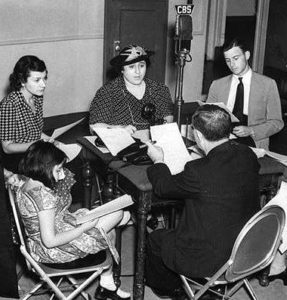The United States welcomed a wave of immigrants from the 1880s to 1920s, and foreign accents were a huge part of everyday life in the U.S. well into the twentieth century. In big cities, that usually included the Yiddish accents of some of the millions of Ashkenazic Jews who arrived in those years.
Network radio in the U.S. began in 1926. As a result, immigrant roles were a staple of early radio… sometimes played for laughs and sometimes portrayed as multidimensional human beings.
The Goldbergs

Series creator and star Gertrude Berg (center) with cast members from the CBS run of THE GOLDBERGS, probably mid to late 1930s.
Radio’s pioneer of well-developed Jewish immigrant characters was Gertrude Berg, who wrote and starred in The Goldbergs. This series, which ran from the 1920s to 1950s, premiered on NBC in 1929 as The Rise of the Goldbergs. It began as a weekly slice of life about Yiddish-accented Molly and Jake Goldberg and their American kids, Sammy and Rosalie. For most of the run, they lived in a Jewish immigrant neighborhood in the Bronx, and Jake worked in the garment industry. Molly Goldberg’s Uncle David (played by Yiddish theater star Menasha Skulnik) lived with the family.
NBC quickly expanded it into a daily soap opera about the sorrows and joys of the Goldbergs and their Continue reading
